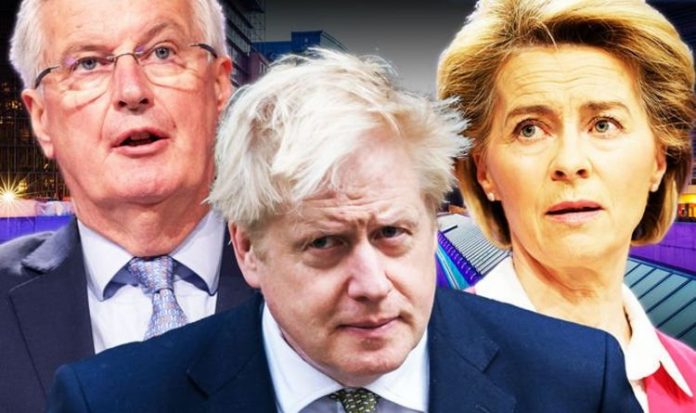Prime Minister Boris Johnson was in a jubilant mood as he pushed his Brexit trade deal with the EU over the line just days before the transition period ended on January 1. After signing the agreement, he said: “By signing this deal, we fulfil the sovereign wish of the British people to live under their own laws, made by their own elected Parliament.” European Commission President Ursula von der Leyen struck a unifying tone after months of arduous and often heated talks. She said: “It was a long and winding road, but we have got a good deal to show for it. It is fair. It is a balanced deal. And it is the right and responsible thing to do for both sides.”
However, any assumption that Brussels and London’s squabbling would be over by securing a trade deal was previously rubbished by one expert, who claimed any agreement only sets a platform for more disputes.
Ivan Rogers, former UK ambassador to the EU, warned back in November that a deal may not end disagreements, as the UK’s gradual divergence away from EU laws and regulation could spark fresh rows.
He said: “There are lots of forces driving a gradual divergence.
“The question is, is that divergence governable and relatively smooth and reasonably amicable whilst we remain close friends, or does it become bumpy, difficult, conflictual, or maybe worse than conflictual — constantly flaring up into trade wars as people bite chunks out of each other?”
The UK has agreed to level playing field measures on workers’ rights, as well as many social and environmental regulations.
But in the future, the UK has the license to diverge from some of these agreements – forming more bespoke laws on its regulation.
To police this, both Brussels and London have agreed to a dispute mechanism, meaning if one side does not agree with divergence from certain rules, the mechanism can be acted upon.
READ MORE: Brexit fury: Spain claimed ‘we won Gibraltar’
This could lead to tariffs being placed on certain goods, risking trade wars if retaliation follows.
A Downing Street source told Politico in November that “there are no plans” for the Brexit trading relationship to reach this stage.
They said: “We’ve always been clear that just because we’re leaving the EU doesn’t mean we don’t want a close relationship with them.
“We will still have a lot of shared values and history. There is still a huge amount of work we can do with each other. There is definitely no strategy to be antagonistic.”
Nick Witney, a senior fellow at the European Council on Foreign Relations, argued that “guerilla squabbling” could ensue between the UK and EU.
DON’T MISS
EU accused of trying to make Switzerland ‘a de-facto member’ [INSIGHT]
Joe Biden could snub Boris Johnson for Emmanuel Macron [ANALYSIS]
EU told ‘Polexit process may have already started’ [INSIGHT]
He said: “I think the last thing this government will want to do is deal with the EU more than it has to.
“That has been very clear in the way in which it’s narrowed down the partnership to something as emaciated as possible.
“I think there will be low level guerrilla squabbling. I can’t see it being entirely smooth. A bit like a frozen conflict, in a way.”







